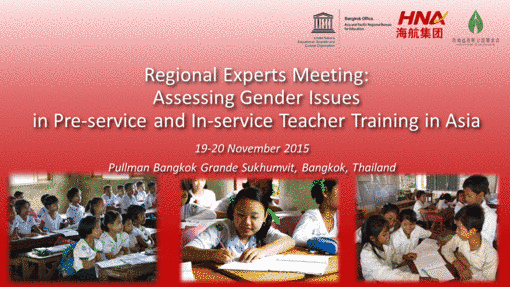Regional Experts Meeting: Assessing Gender Issues in Pre-service and In-service Teacher Training in Asia, 19-20 November 2015, Bangkok
Background
The Dakar Framework for Action highlights the need for learning content and materials to encourage and support gender equality and respect. Therefore, gender-responsive curricula have great potential to build knowledge and skills that support learners to examine dominant power structures, question gender stereotypes, promote positive gender relations, and advance towards gender equality. The 2015 Education for All Global Monitoring Report found, however, that gender bias in textbooks remains pervasive in many countries. This bias can affect children’s self-esteem, lower their engagement in schools and limit their expectations about their future opportunities, including career options.
Nonetheless, a coherent approach to gender mainstreaming is needed where all components and processes of the education sector mutually support gender equality goals. For gender equality to be a ‘lived’ reality in classrooms, teachers themselves must be gender sensitive and practice gender-responsive teaching. To do so, teachers must be provided with appropriate gender-sensitive education and training, both pre- and in-service, so that they can play a critical role in eliminating all forms of gender-related discriminations in and beyond the classrooms.
Gender assessments of curriculum and student textbooks have been undertaken in Asia and elsewhere, and can be important impetus for curricular modifications and revisions at the school level. Sector-wide gender assessments appear to be relatively uncommon in the region, although studies have been undertaken of different aspects including human resources, decision-making and other processes. However, there have been limited gender assessments of teacher training materials and other resources used in the teaching practice.
UNESCO’s Asia-Pacific Regional Bureau for Education (UNESCO Bangkok) has initiated a five-year project “Enhancing Girl’s and Women’s Right to Quality Education through Gender Sensitive Policy Making, Teacher Development and Pedagogy” targeting five countries in Asia (Cambodia, Myanmar, Nepal, Sri Lanka and Uzbekistan) with support from China/HNA Funds-in-Trust.
As part of this project, UNESCO Bangkok is organizing a regional experts meeting to take stock of gender issues in teacher education in the participating countries, and assist with the development of diagnostic tools to assess gender issues in pre-service and in-service teacher education, with a particular focus on identifying and redressing gaps, stereotypes and bias in curriculum materials including curricula/syllabi, teacher support materials, and students’ textbooks in core subjects at basic education level (Grades 1-9).
Draft gender assessment frameworks will be prepared prior to the meeting, drawing on a review of existing tools and practice in the region and other settings.
Objectives
The objectives of this experts meeting are to:
- Review the status of participating countries in undertaking gender assessments in the education sector in general, and curriculum materials used in pre-service and in-service teacher training in particular.
- Review and provide inputs for improving the draft instruments for national gender assessments of curriculum materials including curricula/syllabi, teacher support materials, and students’ textbooks in core subjects.
- Develop action plans for taking forward the gender assessment in participating countries, including the overall scope of work, methodology, timelines, persons responsible and budget.
Expected outputs and outcomes
Outcomes and outputs expected of the meeting include:
- Enhanced understanding of approaches to analyze gender issues in teacher education and instructional materials, curricula/syllabi and students’ textbooks
- Agreed framework for the gender assessment tools, including templates for a tool to analyze teacher education curriculum, student curriculum, and student textbooks for core subjects at basic education level (Grades 1-9).
- Action plans to conduct gender assessment in the participating countries.
Dates and Venue: 19-20 November 2015 | Pullman Bangkok Grande Sukhumvit, Bangkok, Thailand
Participants
The meeting will bring together approximately 35-40 participants. They include four to five people from each project country: one official from the Ministry of Education with gender coordination roles, one education planner from the Ministry of Education, one teacher educator from a teacher education institution, one researcher who will lead the gender assessment in teacher education in the country and one UNESCO staff from respective Field Office. These country teams are expected to lead and implement the gender assessment in their respective countries in 2016. Other experts and resource persons will also be invited to contribute to the technical discussions, share information and experiences, and promote broader links to global and regional initiatives.
Resources
- Concept Note (PDF, 342kb)
- Programme (PDF, 440kb)
- Information Note (PDF, 327kb)
Presentations
Enhancing Girl’s and Women’s Right to Quality Education through Gender Sensitive Policy Making, Teacher Development and Pedagogy (Libing Wang, Chief of APEID Unit, UNESCO Bangkok) - pdf, 497kb
Session 1:
Understanding Gender Issues and the Status of Gender Assessments in the Education Sector (Justine Sass, Chief of HP2 Unit, UNESCO Bangkok) - pdf, 477kb
Session 2:
- Conceptual Framework and Methodology for Gender Assessment in Teacher Education (Karabi Baruah, Consultant, UNESCO Bangkok)
Session 3 (Plenary discussions): Feedback for Improving the Overall Structure of the Tool
Session 4:
- Designing Gender Assessment Tool: Characters Embodied in Texts (Karabi Baruah, Consultant, UNESCO Bangkok) - pdf, 813kb
Session 5:
- Designing Gender Assessment Tool: Characters Embodied in Illustration (Karabi Baruah, Consultant, UNESCO Bangkok) - pdf, 824kb
Session 6:
- Designing Gender Assessment Tool: Data Collation, Analysis and Reporting (Karabi Baruah, Consultant, UNESCO Bangkok) - pdf, 302kb
Session 7:
- Including Gender In Teacher Education: Challenges and Ways Forward (Huma Masood, National Programme Officer (Gender & Education), UNESCO New Delhi) - pdf, 1.5mb
- Gender Equality in Teacher Training: A practice from China (Zhao Yuchi, Administration Officer, International Research and Training Centre for Rural Education (INRULED)) – pdf, 546kb













